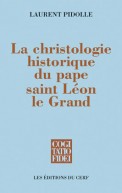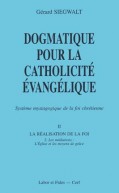
Le Christ dans l'histoire selon le pape Pie XI - CF 265
Collection Cogitatio Fidei - N° 265
784 pages - nov. 2008
80,30€
Pie XI règne du 6 février 1922 au 10 février 1939, c'est-à-dire entre les deux grandes guerres de la première moitié du XXe siècle. Cette situation historique constitue « le point de départ » de la christologie des encycliques de Pie XI. Au cœur des années bouleversées de son pontificat, il lance une devise, véritable porche d'entrée de toute sa pensée, de tout son gouvernement, présentée dans l'encyclique inaugurale « Ubi arcano », souvent citée par les encycliques postérieures : « De pace Christi in regno Christi quaeranda. » Traduisons : « À la recherche de la paix du Christ par le Règne du Christ. » Sa christologie est une réponse aux défis de ces conflits à répétition qui détruisent l'humanité dans ses dimensions collectives et individuelles, et peuvent entraîner, pour les hommes de bien de toute origine, un profond découragement, voire le désespoir. Dans cet ouvrage, Marie-Thérèse Desouche cherche à élucider cette orientation christologique et à comprendre la figure de ce « Christ de la paix » que les encycliques de Pie XI proposent. Il s'agit de mettre en lumière l'analytique de la christologie des encycliques, c'est-à-dire la façon dont elles fixent leur point de départ, sélectionnent des matériaux hérités de la tradition ecclésiale et les agencent de manière originale pour tracer une figure du Christ qui fasse sens dans le monde du temps. En outre, étudier la christologie magistérielle de Pie XI, c'est découvrir en même temps qu'elle est située dans l'histoire des doctrines ; c'est s'interroger sur son caractère de réelle nouveauté, sur sa cohérence et ses ambivalences ; c'est mettre en évidence les innovations apportées, d'une part pour la christologie en général, d'autre part et plus largement pour la théologie aujourd'hui ; c'est montrer enfin comment cette christologie s'inscrit dans le développement ultérieur de la théologie universitaire et dans les renouveaux spirituels, comment elle est un prélude au concile Vatican II dans la doctrine de foi qu'il proposera à l'Église.
--
Pope Pius XI reigned from February 6, 1922 to February 10, 1939, i.e. between two world wars during the first half of the 20th century. This historic situation constitutes ‘a point of departure’ for the Christology of Pius XI’s encyclicals. At the core of the dramatic years of his pontificate, he issued a motto which constitutes a authentic gateway to all his thinking, all his government. It was presented in the inaugural encyclical, ‘Ubi arcano’, often quoted by later encyclicals: ‘De pace Christi in regno Christi quaeranda.’ Translation: ‘In search of the peace of Christ by the reign of Christ’. His Christology was a response to the challenges of those repeated conflicts which destroyed humanity in its collective and individual dimensions and led to profound discouragement, indeed despair, in men of goodwill whatever their origins. In this book, Marie-Thérèse Desouche seeks to elucidate this Christological orientation and to understand the figure of a ‘Christ of peace’ as presented in the encyclicals of Pius XI. The challenge is to cast light on their analytical foundation, i.e. how they fixed their point of departure, selecting materials passed down from the ecclesial tradition and rearranging them in an original way in order to depict an image of Christ which makes sense in the temporal world. Moreover, to study the magisterial Christology of Pius XI means to discover its place in the history of doctrines and investigate its character of true originality, its consistency and its ambivalence. To highlight the innovation it brings, firstly for Christology in general, secondly and more broadly for contemporary theology. Finally, to show how this Christology is essential to the subsequent development of academic theology and spiritual renewal; how it forms a prelude to the Vatican II Council in the doctrine of faith it proposes to the Church.
--
Pope Pius XI reigned from February 6, 1922 to February 10, 1939, i.e. between two world wars during the first half of the 20th century. This historic situation constitutes ‘a point of departure’ for the Christology of Pius XI’s encyclicals. At the core of the dramatic years of his pontificate, he issued a motto which constitutes a authentic gateway to all his thinking, all his government. It was presented in the inaugural encyclical, ‘Ubi arcano’, often quoted by later encyclicals: ‘De pace Christi in regno Christi quaeranda.’ Translation: ‘In search of the peace of Christ by the reign of Christ’. His Christology was a response to the challenges of those repeated conflicts which destroyed humanity in its collective and individual dimensions and led to profound discouragement, indeed despair, in men of goodwill whatever their origins. In this book, Marie-Thérèse Desouche seeks to elucidate this Christological orientation and to understand the figure of a ‘Christ of peace’ as presented in the encyclicals of Pius XI. The challenge is to cast light on their analytical foundation, i.e. how they fixed their point of departure, selecting materials passed down from the ecclesial tradition and rearranging them in an original way in order to depict an image of Christ which makes sense in the temporal world. Moreover, to study the magisterial Christology of Pius XI means to discover its place in the history of doctrines and investigate its character of true originality, its consistency and its ambivalence. To highlight the innovation it brings, firstly for Christology in general, secondly and more broadly for contemporary theology. Finally, to show how this Christology is essential to the subsequent development of academic theology and spiritual renewal; how it forms a prelude to the Vatican II Council in the doctrine of faith it proposes to the Church.
- Dimensions : 135x215x40
- ISBN : 9782204085724
- Poids : 940 grammes
Avec la collaboration de : Claude Dagens
DANS LA CATÉGORIE
La Christologie historique du pape saint Léon le Grand - CF 290
de Laurent Pidolle
400 pages - oct. 2013
Dogmatique II-2 : Les médiations : L'Église et les moyens de grâce
de Gérard Siegwalt
402 pages - janv. 1993






